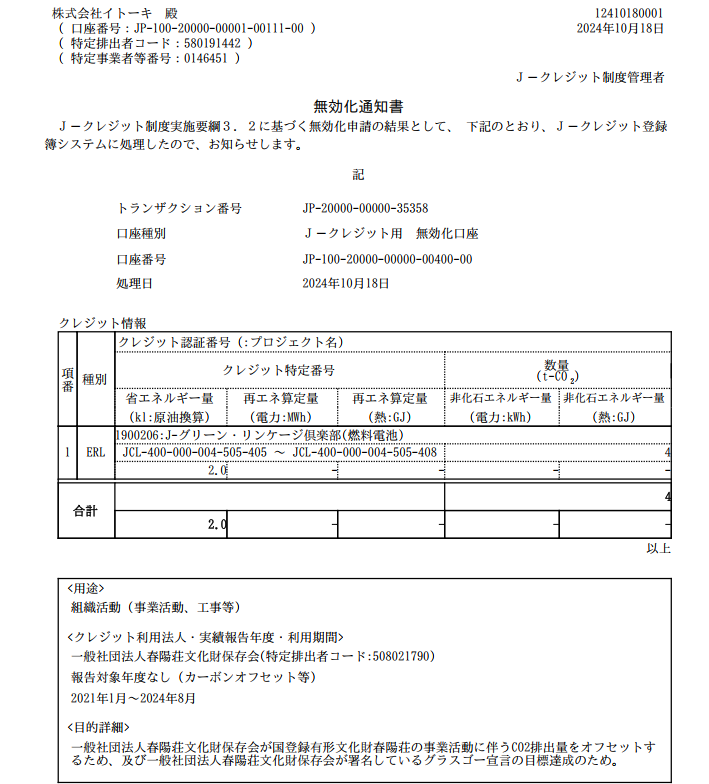Energy is essential to our daily lives. One way or another, we need to depend on the fossil fuels to provide lodging, restaurants, and events. On the other hand, we are experiencing natural phenomena on an unprecedented scale, such as the recent torrential downpours, heavy snowfalls and droughts, and the flooding in 2004, which was also seen in the Dabutsu River that flows in front of Shunyoso. In order to preserve our cultural assets for future generations, we are aware that our activities are triggering global warming, and we believe that sustainable management is required to minimize its effects. Shunyoso believes that the following activities are contributing to global warming, and we are consciously implementing activities to address them.
SHUNYOSO-CARBON-FOOTPRINT-REPORT-2024
- Reviewing the electricity sources: This is a factor that depends on how the power company we select generates electricity. Shunyoso has chosen to contract with a company that generates over 50% of its electricity from natural energy sources. Our goal is 100%, but the unit price is still high, so we are waiting for the right timing to execute it.
- Conserving energy: The majority of light bulbs are LEDs, and some fluorescent bulbs are used in areas where we have determined that it is better not to change to retain the quaint look of the old fixtures. Newly installed appliances are energy-efficient models, taps with switches are widely used where necessary, outdoor lighting is provided with light and motion sensors, and solar-powered lights, ventilation fans, and surveillance cameras have been installed.
- Decarbonization of air conditioning and hot water supply: In the summer, we have to use air conditioning to keep our customers comfortable, but we usually use screens, mosquito nets, and fans in the summer because of the good ventilation in the traditional houses. In winter, the main house is heated and supplied with hot water by natural gas, which is cleaner than kerosene, as needed, and the guest house is heated and supplied with hot water by a wood boiler. In case of rain or other inclement weather, or when the water temperature drops below 50 degrees Celsius, the hybrid system switches to natural gas. A wood-fired boiler is also used in the main house to supply hot water for the baths.
- Supporting local production for local consumption: We avoid supplying food and beverages from distant places as much as possible. This includes not serving coffee from abroad and limiting the use to only Japanese tea. We also limit the restaurants we introduce to our customers to those that sell Awaji-Island-sourced foods, and ask for their cooperation in reducing indirect emissions and contributing to the local economy.
- Recycling and upcycling efforts: old furniture, fixtures and fittings and kerosene stoves that had been stored in warehouses are renewed and upcycled into washstands, wall materials, and LED lamps; laminated bamboo flooring and bar tables are made from fast-growing bamboo; and Awaji gravel from Awaji Island and landscaping is done with crushed and recycled roof tiles.
- Providing transportation and access information: The shuttle van is a special vehicle that can accommodate up to two wheelchairs in addition to 6 other passengers. These customized vehicles still do not come available as EV or hybrid on the market unfortunately, but we plan and take the shortest route, stop idling, and carry only what is necessary. We are also making efforts to raise customer awareness by visualizing the actual amount of carbon dioxide emissions depending on what mode of transportation to access Shunyoso is selected.
- Plastic-free: We have declared in Japan and overseas that we use as little plastic as possible, especially plastic bottles, which require energy from manufacturing to disposal and recycling, and are not very environmentally friendly due to microplastic issues. For cyclists and others who carry water bottles, we have installed a faucet next to the gatepost at the front entrance so that they do not have to buy plastic bottles but fill them for free, and we do not place them in the rooms either.
- Participation in the Glasgow Declaration on Climate Change: On November 4, 2021, the Glasgow Declaration on Climate Change Action in Tourism was launched at the 26th Conference of the Parties (COP26) of the United Nations Framework Convention on Climate Change. The Declaration aims to commit the tourism sector to accelerate climate change action in tourism, halve carbon dioxide (CO2) emissions in the tourism sector over the next decade, and achieve “net zero emissions” by 2050. As of November 21, all As of November 2009, approximately 300 organizations worldwide have signed the agreement, and the ‘Shunyoso Cultural Properties Preservation Society’ is one of three signatory organizations in Japan that have announced their participation. Specifically, we are managing the above 1 to 7, conducting publicity activities to encourage more people to practice climate change countermeasures, and accepting inspection tours as part of our efforts to achieve “Cultural Properties x SDGs”. Please click the icon below to see the Declaration. Do join to be on our global team!
 Certificate on Carbon Removal Credits from 2021 to August 2024.
Certificate on Carbon Removal Credits from 2021 to August 2024.

